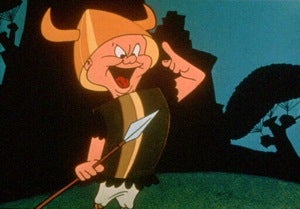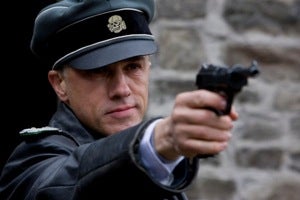The movie industry can give 17 Oscars to 10 hours of movies about a magic ring, but they’d rather not pay attention to 19 hours of opera about a magic ring.
That’s one lesson of the Ring Festival L.A., an elaborate, wide-ranging arts festival that’s now taking place in Los Angeles with the participation of the theater, music, art and academic communities — but scant notice from Hollywood.
The L.A. County Museum of Art is involved, and the Museum of Contemporary Art, the Getty Trust, the Center Theater Group, the Geffen Playhouse, the Griffith Observatory, the Los Angeles Conservancy, UCLA and USC and many more.
But not Hollywood. Where — just to name one obvious oversight — are the screenings of Peter Jackson’s “Lord of the Rings” with a discussion of the ways in which J.R.R. Tolkien mined the same Teutonic myths that Richard Wagner drew upon for his massive cycle? (The public library in La Verne did a discussion, but not screenings.)
The Ring Festival was designed to supplement the Los Angeles Opera’s presentation of the four operas in Wagner’s "Ring of the Nibelungen," the most monumental undertaking any opera company can mount and the first in the history of L.A.
It’s a significant (if controversial) cultural event that should be reaching a peak as the opera company wraps up the first of three complete cycles of the operas. The L.A. Opera’s general director, crossover icon Placido Domingo, calls it “the largest, most significant cultural festival in Los Angeles since the 1984 Olympic Arts Festival.”
So what is the movie business doing this month to celebrate the culmination of this massive effort?
Well, the American Cinematheque is showing “Apocalypse Now Redux” on Friday night. Because, after all, Robert Duvall’s Lieutenant Kilgore blares “Ride of the Valkyries,” from ring opera numbe 2 “Die Walkure,” during a four-minute helicopter attack at one point in the movie.
And the Los Angeles Film Festival is showing 1913 silent film “The Life of Richard Wagner” on June 20 at REDCAT.
That’s it.
Sure, last month the Academy presented a program called “What’s Opera, Doc?” that dealt with classical music in cartoons, and before that AMPAS collaborated with the Los Angeles County Museum of Art to screen Fritz Lang’s two “Der Nieberlungen” films.
And back in April the Sundance Film Festival institute showed a documentary called “Sing Faster: The Stagehands’ Ring Cycle.”
But apart from these programs and a handful of movies shown by the Opera League of Los Angeles and the city’s Department of Cultural Affairs, Hollywood appears to be sitting this one out.
The L.A. Opera is not complaining — and they’d probably dispute the characterization. When asked about the scarcity of Hollywood-related activities, a spokesperson said the organization “has been very pleased with its Ring Festival L.A. film partnerships and the events have been very well attended,” and singled out the Academy and its director of educational programs and special projects, Randy Haberkamp.
But is it too much to ask that Hollywood organizations apart from its non-profits get involved?
It’s not just "Lord of the Rings." Where are the revivals of other German movies of the ‘20s and ‘30s, or even more recent films (say, “Downfall” or “The Lives of Others” or “The White Ribbon”) that deal with or draw upon the time in which the late composer’s music was appropriated and exalted by the Nazis?
For that matter, you could make a case that Quentin Tarantino’s “Inglourious Basterds” could fit, and could help start a dialogue.
In fact, the movie industry is ideally situated to emphasize a side of the picture that the festival, which drew heated criticism from some in the Jewish community, has tried not to ignore – Wagner’s clear anti-Semitism, and the way in which his work was embraced during the darkest, most hateful era of 20th century European history.
Where are the programs of films made by the many European Jews who fled the Nazis and came to Hollywood, or of the European composers who helped create the vocabulary for film music after leaving a tumultuous continent where the emerging power still extolled the anti-Semitic Wagner as the ultimate in musical expression?
Hell, where’s the screening of Ken Russell’s insane 1975 film “Lisztomania,” in which Roger Daltrey plays Franz Liszt as a 19th Century rock star and Paul Nicolas plays Wagner as a Nazi vampire of sorts?
And while we’re at it, where are the high-profile entertainment industry backers of this entire enterprise? The New York classical community has Alec Baldwin as a prominent, vocal supporter (and occasional disc jockey), while in Los Angeles we’re just reinforcing the stereotype that the town has lots of entertainment but no culture.
(That’s not to say the community has been completely absent: Marisa Tomei, Jacqueline Bisset and Michael York have gone to festival events, while Christoph Waltz, right – the “Jew hunter” in “Inglourious Basterds” – attended a performance of “Die Walkure.”)
UPDATE: Thanks to reader Lolitahaze for pointing out another "Basterds" connection: Quentin Tarantino was at Thursday night’s performance of "Siegfried."
The point is, Hollywood could have shown significantly more support of what was designed to be an all-encompassing cultural event, and it could have done so without ignoring the controversy that arises with any event devoted to Wagner. But it didn’t.
In a festival of more than 100 events, including three dozen music, dance and theater productions, another three dozen seminars and symposia, and a variety of exhibitions of all varieties, the movie industry is barely represented.
And that’s a shame.





